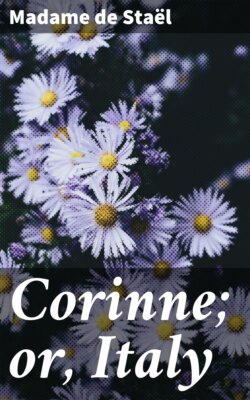Читать книгу Corinne; or, Italy - Madame de Staël - Страница 18
На сайте Литреса книга снята с продажи.
CHAPTER IV.
ОглавлениеThe senator took the crown of bays and myrtle he was to place on the brow of Corinne. She removed the shawl which had bound the ebon curls that now fell about her shoulders, and advanced with an air of pleased thankfulness, which she strove not to dissemble. Again she knelt; but not in trepidation, as at first. She had just spoken, had filled her soul with godlike images; enthusiasm had surmounted timidity; she was no longer the shrinking maid, but the inspired vestal who exultingly devoted herself to the worship of Genius.
When the chaplet was set upon her head, the musicians sent forth one of those triumphant airs which so powerfully exalt the soul. The clash of cymbals, and the flourish of trumpets, overwhelmed Corinne afresh; her eyes filled, she sunk on a seat, and covered her face. Oswald rushed from the crowd, and made a few steps towards her, but an uncontrollable embarrassment kept him silent. Corinne, taking care that he should not detect her, looked on him for some time; and when Prince Castel Forte took her hand to lead her from the capitol, she yielded in abstraction, frequently turning, on various pretexts, to gaze again on Oswald. He followed her; and as she descended the steps, one of these gestures displaced her crown, which Oswald hastily raised, and presenting it, said in Italian a few words, implying that humble mortals lay at the feet of their deities the crowns they dare not place upon their brows.[1] What was his astonishment when Corinne thanked him in English, with that insular accent which can scarce ever be acquired on the Continent; he remained motionless, till, feeling himself almost faint, he leaned against one of the basaltic lions that stand at the foot of the staircase. Corinne gazed on him again, forcibly struck by his emotion; but they led her to her car, and the whole crowd had disappeared, long ere Oswald recovered his presence of mind. Till now, he had been enchanted as with a most attractive foreigner; but that English intonation had brought back all the recollections of his country, and, as it were, naturalized in his heart the charms of Corinne. Was she English? Had she not passed many years of her life in England? He could not guess; but it was impossible that study alone could have taught her to speak thus. She must have lived in the same country with himself.
Who could tell, but that their families might have been related? perhaps he had even seen her in his childhood. There is often in the heart some innate image of the beings we are to love that lends to our first sight of them almost an air of recognition. Oswald had believed the Italians, though impassioned, too vacillating for deep or constant affection. Already had the words of Corinne given him a totally distinct view of their character. What then must he feel should he thus at once revive the remembrance of his home, and receive a new-born life, for future enjoyment, without being weaned from the past? In the midst of these reveries he found himself on the bridge of St. Angelo, which leads to the castle of that name, or rather to Adrian's tomb, which has been converted into a fortress. The silence of the scene, the pale waves of the Tiber, the moonbeams that lit up the statues, till they appeared like pallid phantoms, steadfastly watching the current of time, by which they could be influenced no more; all these objects recalled him to his habitual train of thought; he laid his hand on his breast, and felt the portrait of his father, which he always wore; he drew it forth, and gazed on it, while the cause of the felicity he had just enjoyed but too strongly reminded him of all that long since had tempted his rebellion against his parent.
"Ever haunting memory!" he cried, with revived remorse, "too wronged and too forgiving friend! could I have believed myself capable of feeling so much pleasure thus soon after thy loss? but it is not thine indulgent spirit which rebukes me; thou wouldst have me happy in spite of my faults; or may I not mistake thy mandates now uttered from above, I, who misunderstood them while thou wert yet on earth?"
[1] Lord Nevil must have alluded to the beautiful lines of Propertius—
"Ut caput in magnis ubi non est ponere signis;
Ponitur hic imos antè corona pedes."
